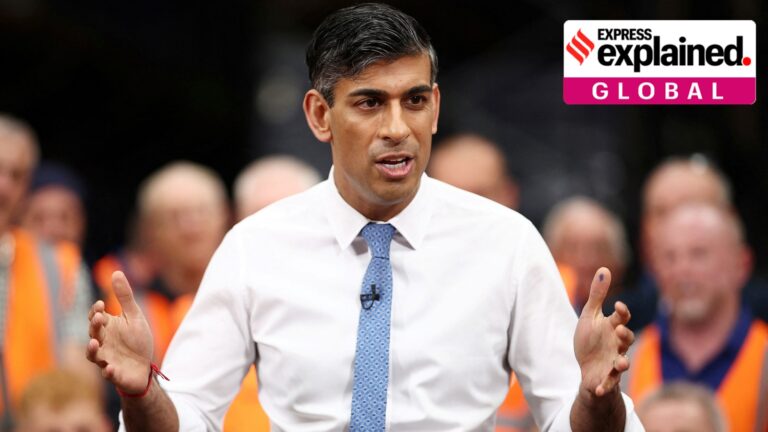Chancellor Rishi Sunak announced on Wednesday (22 May) that the UK will hold an election on 4 July, despite the deadline for an election not being until January 2025.
this is, The dire state of Mr Sunak’s ruling Conservative Party With the Conservatives currently trailing the opposition Labour Party by double-digit percentage points in most opinion polls, what was Sunak’s reasoning behind his decision?
“It’s not the worst option.”
“The polls remain dismal but No 10’s logic was that July was the least bad option, all things considered,” the Conservative UK paper said. The Daily Telegraph Their analysis states:
Over the past few months, Chancellor Sunak’s Britain has seen some of the “positive” developments he has repeatedly spoken about, including falling inflation, a recovery in economic growth (albeit limited), a decline in net immigration, and Rwanda Deportation Plan Analysts believe Sunak’s bet is aimed at using these “upsides” to maximise the Conservative Party’s electoral chances.
This is especially true as the coming months could be tough. “But with more people finding themselves unable to repay their low-cost fixed-term mortgages and facing rising monthly repayments, and with the small boat crisis showing little sign of abating, there are fears that the bad news could outweigh the good if Mr Sunak waits until the autumn.” Telegraph report.

The economics behind the decision
Many argue that the trajectory of the UK economy underlies the decision to vote early.
The Office for National Statistics said on Wednesday that inflation had fallen to a three-year low of 2.3%, just above the Bank of England’s 2% target and well below the peak of 11% expected at the end of 2022. GDP data showed the UK slipped into a technical recession in 2023 before returning to nominal growth of 0.6% in the first quarter.

“From an economic perspective, now may be the perfect time for the Conservatives to take on Labour, as Labour’s proposals hinge on the promise of economic stability,” writes economist John Bryson. conversation.
“So the Conservatives can argue that there is evidence that the UK has already reached a period of stability on which economic growth can be based. Vote for us and we will build on this work, they say,” he wrote.
Indeed, economic growth was at the heart of Sunak’s election manifesto: “Our economy is growing faster than anyone expected. Who will you trust to turn that foundation into a secure future for you and your family?” he said in his manifesto, adding that voters could choose “to build on the progress we’ve made or risk going back to square one”.
Moreover, August’s budget was likely not “spectacular” from a Conservative perspective, with a string of big spending sprees including an increase in defence spending by Mr Sunak’s government and a compensation package running into billions of pounds. Victims of the infected blood scandal And that Post Office Scandal That leaves little room for tax cuts or other measures, one Conservative source said. The Daily Telegraph“If you don’t have money to donate before the election, what are you waiting for?”
Other factors: Farage and internal Conservative politics
Another reason for an early election is the threat to the Conservatives from Nigel Farage and his far-right Reform Party, which has already made significant inroads into the Conservative vote in recent years and analysts say a later election date would have given Farage an advantage.
As things stand, Farage has decided not to stand in the upcoming UK election, seemingly justifying Sunak’s call. “I will support the campaign in some small way, but now is not the time to go any further than that,” Farage said in a statement on Thursday.
“The general election in the United States on 5 November will have huge global implications,” he wrote. In recent months, Mr Farage has appeared on US talk shows and other events to campaign for his “partner” Donald Trump.
That said, the Reform Party will be particularly poised to challenge the Conservatives in around 30 seats. Under the leadership of leader Richard Tice, the party is expected to win more than 20% of the vote in a series of constituencies in the north and midlands of England, helping them to lose those seats to the Conservatives, according to the latest YouGov data.
For the Conservative party, the announcement of the early election was also intended to provide a pause on internal disputes and stem the steady flow of party defections that have occurred in recent months. So far, this strategy has not paid off, with a further 78 Conservative MPs resigning (choosing not to stand for re-election) since the election was announced.
There are also personal gains for Mr Sunak: Many in his party wanted him ousted after the Conservatives’ disastrous performance in the local elections in March. He is in a good position now, especially given the country’s economic recovery, but there is no guarantee this will last.
After all, the Conservative Party, which has been in power across the country since the 2010 general election, is still likely to lose the election. Sunak’s latest gamble is simply to make the best of a bad situation.


